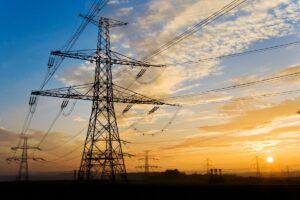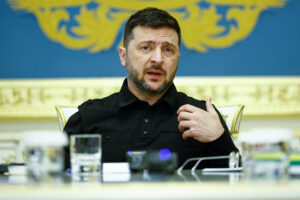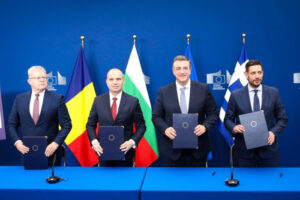
The record daily volume of electricity imports to Ukraine in January was 41.987 GWh, the Ministry of Energy reported on Sunday in Telegram.
“This support was made possible by the expansion of transmission capacity: in January, the power limit for imports from the EU was set at 2,450 MW, which is an absolute record since Ukraine joined the ENTSO-E network,” the ministry said.
It is noted that this helped to maintain the system and reduce the deficit amid Russian attacks and severe frosts.
As reported by Ukrainian President Volodymyr Zelenskyy, as of January 16, electricity consumption in Ukraine was 18 GW, while the capacity to provide it was “11 GW or so.”

In December 2025, Express Insurance settled 235 insurance claims under compulsory civil liability insurance (CMTPL) for a total of UAH 10.3 million, which is 13% more than in November of the same year, according to the insurer’s website.
It is also noted that in 47% of cases, the victims filed insurance claims with the participation of the police, and another 53% were filed under the Europrotocol procedure, with the maximum compensation amounting to UAH 131,500. Among the insurance claims settled in December, the largest payment involving the police was UAH 250,000.
“This structure of settlements indicates an increase in drivers’ confidence in simplified procedures for reporting traffic accidents and their active use in practice,” the information emphasizes.
In total, over the 12 months of 2025, the number of settled insurance events under MTPL amounted to 2,442 thousand for a total amount of UAH 102.9 million.
Express Insurance LLC was founded in 2008 with the participation of the leader of the Ukrainian automotive market, UkrAvto Group. The company specializes in auto insurance.
The company is represented in more than 60 points of sale throughout Ukraine and is actively expanding its network of partner service stations. Today, the number of service station partners exceeds 100.

In an evening address, Ukrainian President Volodymyr Zelensky announced that the Ukrainian negotiating team will hold a preparatory meeting tomorrow to agree on the framework for future negotiations and all organizational details, and on Monday, February 2, will travel to the United Arab Emirates to participate in trilateral negotiations scheduled for Wednesday and Thursday of next week.
“There was a report from our negotiating team. An agreement has already been reached on a trilateral meeting at the appropriate level. This meeting will take place next week, as planned, on Wednesday and Thursday. In the Emirates, as last time,” Zelensky emphasized.
Zelensky added that a meeting is scheduled for Monday to agree on the framework for the talks and prepare for the negotiations, and the team will set off on Monday evening.
“Many leaders and different countries are with us in this process, supporting Ukraine, and we are coordinating on a daily basis. In February, we will be quite active in foreign policy, and starting tomorrow, we will have contacts and meetings,” the president said in a statement.

According to Serbian Economist, the European Commission is preparing decisions within the framework of the new EU visa strategy, which should alleviate some of the problems for carriers from the Western Balkan countries amid the ongoing blockades of freight terminals on the borders with the European Union.
Executive Vice-President of the European Commission Hena Virkkunen said that the EC is aware of the difficulties faced by transport operators in the region due to the application of Schengen rules and stressed that the Entry/Exit System (EES) does not introduce new requirements for short stays. EES) does not introduce new requirements for short-term stays. At the same time, she said, the European Commission is seeking “more flexibility without compromising security” and “is addressing this issue as part of its visa strategy.”
In recent days, truck drivers in Serbia, Bosnia and Herzegovina, Montenegro, and North Macedonia have been blocking access to freight terminals on the EU border in protest against stricter enforcement of the 90-day stay rule within a 180-day period in the Schengen area, which, according to business estimates, leads to the detention and deportation of drivers and increases costs for carriers.
Serbian Chamber of Commerce and Industry President Marko Čadež previously stated that the blockades are estimated to have halted up to 93% of exports from the countries involved and caused daily losses of around €92 million, with companies incurring additional penalties for delivery disruptions.
The European Commission has indicated that the problem also affects other “highly mobile” professions, and solutions will be developed as part of a new visa strategy.
https://t.me/relocationrs/2196

Ternopiloblenergo JSC will hold an extraordinary general meeting of shareholders in a remote format (survey), with the date of the meeting being the date of completion of voting – February 27, 2026, according to a message in the SMIDA information disclosure system.
According to the report, the meeting was initiated by Ukrainian Distribution Networks JSC, which owns 31.154 million voting ordinary registered shares of Ternopiloblenergo, representing 50.9990% of the total number of ordinary registered shares of the company.
The list of shareholders entitled to participate in the meeting will be compiled as of 23:00 on February 24, 2026. Ballots for voting (except for the election of bodies) are scheduled to be posted on February 17, and ballots for the election of bodies are scheduled to be posted on February 23. Voting will take place from 11:00 a.m. on February 17 to 6:00 p.m. on February 27.
The draft agenda includes issues on the termination of the powers of the current members of the supervisory board and the election of new members (cumulative voting), the approval of the terms of civil law contracts with members of the supervisory board and the establishment of their remuneration, as well as compensation to the initiator for the costs of organizing and holding the meeting.
Ternopiloblenergo JSC (EGRPOU code 00130725) was registered on February 19, 1999, and its main activity is the distribution of electricity. Its authorized capital is UAH 15.272 million, and its director is Volodymyr Humen.

Bulgaria, Greece, and Romania have agreed to prepare a joint application for European funding for a high-speed railway line along the “Western Axis” Athens-Thessaloniki-Sofia-Bucharest, according to the Bulgarian publication Sega.
According to the publication, the initiative was discussed at a meeting between representatives of the three countries and the European Commission in the context of the development of the North-South transport corridor, which is intended to connect the Baltic, Black and Aegean Seas. The meeting was hosted by Bulgarian Deputy Prime Minister and Minister of Transport Grozdan Karadzhov.
Greek Transport Minister Konstantinos Kiranakis said that by 2027, it is planned to provide high-quality passenger rail service between Thessaloniki and Sofia, while the Bulgarian side recalled that rail service on this route was interrupted in 2017.
Karadzhov also noted that the countries intend to synchronize planning, design, and permitting procedures to avoid delays and bureaucratic obstacles. Among Bulgaria’s priorities, he highlighted the acceleration of the project for a new bridge across the Danube between Ruse and Giurgiu, as well as the preparation of projects for new bridges in the Nikopol-Turnu Măgurele and Silistra-Kelerashi areas; the restoration of ferry connections on the Danube, including the Ruse-Giurgiu line, was also mentioned.
According to Sega, Romanian Transport Ministry representative Ionut Cristian Savoiu named among Romania’s priorities the modernization of the existing Giurgiu-Ruse bridge, the construction of a new Danube bridge, and the development of road and rail lines, as well as improvements on the Vidin – Calafat – Craiova section for better connectivity with Ukraine and Moldova.